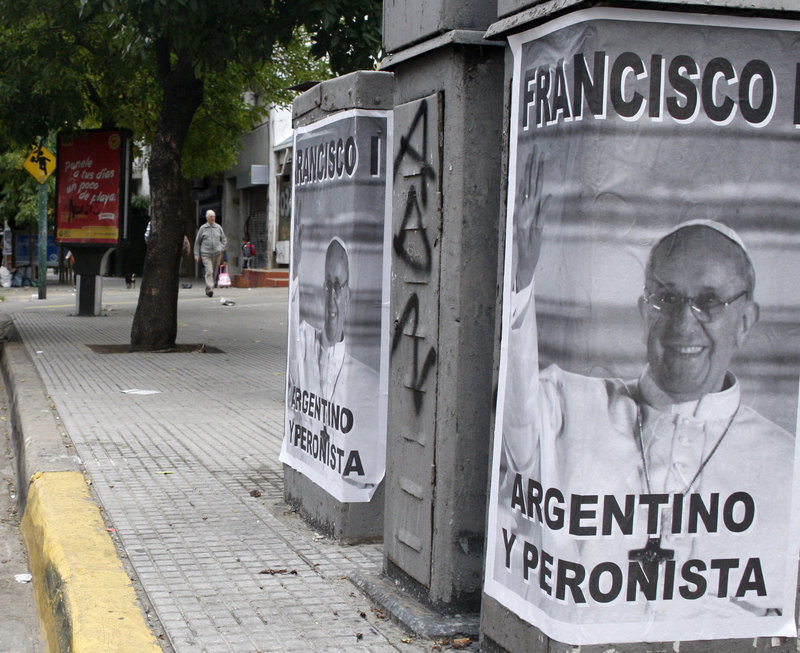BUENOS AIRES, Argentina – A Jesuit priest whose kidnapping by the Argentine military in 1976 has raised the issue of what role newly named Pope Francis played in that country’s so-called “dirty war” said Friday that he was “reconciled to the events” and wished the pope well, but he did not explicitly absolve the pope of involvement in his detention.
In a statement posted on a website in Germany, where the Rev. Francisco Jalics now lives, Jalics recounted the details of his detention, saying he was held for five months, blindfolded and shackled. At the time, the pope, then the Rev. Jorge Mario Bergoglio, was Jalics’ Jesuit superior.
“I’m unable to comment on the role of Father Bergoglio in this matter,” the statement said.
Jalics’ comments were posted on the same day the Vatican angrily denounced news coverage linking Pope Francis to the dirty war, calling the reports a campaign that “is well-known and dates back to many years ago.”
The Vatican said the campaign is being pushed “by a publication that carries out sometimes slanderous and defamatory campaigns,” an apparent reference to Pagina 12, an Argentine newspaper whose editor, Horacio Verbitsky, has written critically of Pope Francis’ role in the dirty war.
Vatican spokesman Federico Lombardi said there “was never a concrete or credible accusation” against Bergoglio, noting he “was questioned by an Argentinian court as someone aware of the situation but never as a defendant.”
On the contrary, “there have been many declarations demonstrating how much Bergoglio did to protect many persons at the time of the military dictatorship,” Lombardi said.
Jalics’ statement, however, seemed likely only to fuel speculation about Pope Francis and the dirty war, when as many as 30,000 people, most suspected leftists, disappeared into military custody, many never to be seen again.
Efforts to reach Jalics were unsuccessful. German broadcaster Bayerischer Rundfunk reported that he was on a multi-month tour of Hungary and would not return to Germany until May.
Jalics’ fellow Jesuit, the Rev. Orlando Yorio, who died in 2000, reportedly held Bergoglio personally responsible for their kidnapping. Verbitsky took the accusation further, accusing Bergoglio in a 2005 book of failing to protect the Jesuit priests who worked in the slums.
According to Verbitsky, Bergoglio, who was the head of the Jesuit order in the country at the time, ordered Jalics and Yorio to stop their social work in the slums after the military junta took power. When they refused, Bergoglio allegedly let the military know they were no longer under the protection of the Jesuits, essentially giving a carte blanche for their kidnapping, according to Verbitsky.
Bergoglio has said he pleaded with the military rulers to release the priests. His supporters insist that their release demonstrated that his lobbying efforts were successful, particularly since the two were held at the Navy Mechanics School, a notorious clandestine prison and torture site.
In his statement, Jalics, a native of Hungary who moved to Argentina in 1957, said he had obtained Bergoglio’s permission, as head of Argentina’s Jesuits, to move to “a slum . . . together with a fellow brother” in 1974, two years before the military overthrew the government of Isabel Peron.
“The two of us in the slum had no contact with the junta or the guerrillas,” Jalics said. Nevertheless, “due to the lack of information and targeted misinformation at that point in time our position was open to misinterpretation within the church.”
When one of their acquaintances from the slum who’d joined the guerrillas was captured, soldiers “learned that he had been in contact with us. We were then arrested on the assumption that we were also associated with the guerrillas.”
Jalics wrote that he and Yorio expected to be released after five days of interrogation. “The officer who was in charge of the questioning released us with the words, ‘Padres, you were not guilty. I will see to it that you can return to the slum,”‘ Jalics said. Instead, “inexplicably to us, we were detained, blindfolded and shackled for five months after that. I’m unable to comment on the role of Father Bergoglio in this matter.”
Jalics does not say precisely when he and Bergoglio next met, though the statement implies that more than 22 years had passed; Bergoglio was named archbishop of Buenos Aires in 1998.
“After we were set free, I left Argentina,” Jalics wrote. “It was only years later that we had the opportunity to discuss the events with Father Bergoglio who in the meantime had been appointed archbishop of Buenos Aires. Following that, we celebrated Mass publicly together and hugged solemnly. I am reconciled with the events and on my part, consider the matter to be closed.”
Send questions/comments to the editors.



Success. Please wait for the page to reload. If the page does not reload within 5 seconds, please refresh the page.
Enter your email and password to access comments.
Hi, to comment on stories you must . This profile is in addition to your subscription and website login.
Already have a commenting profile? .
Invalid username/password.
Please check your email to confirm and complete your registration.
Only subscribers are eligible to post comments. Please subscribe or login first for digital access. Here’s why.
Use the form below to reset your password. When you've submitted your account email, we will send an email with a reset code.